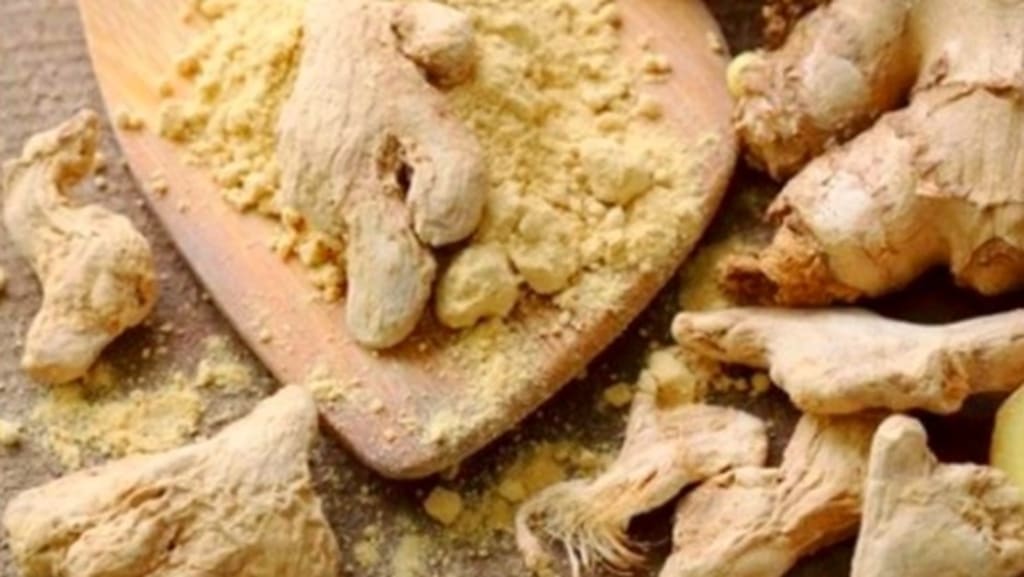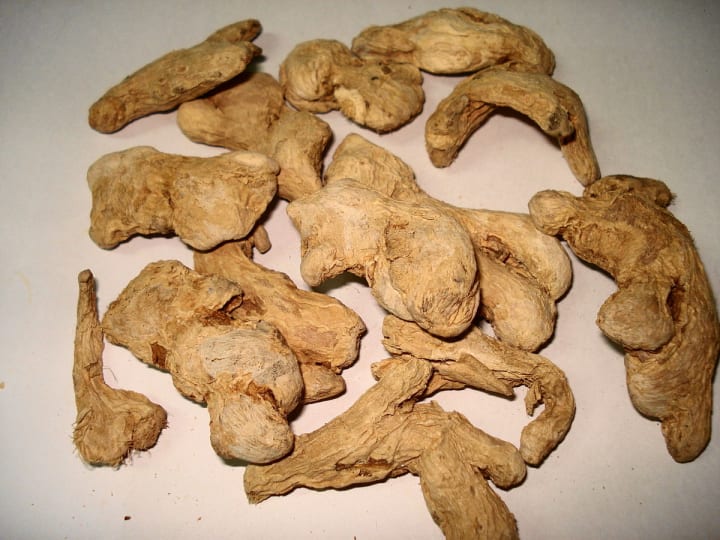
Dry ginger, also known as powdered ginger or ground ginger, is derived from the rhizome of the Zingiber officinale plant. It has been used for centuries as a culinary spice and medicinal herb in various traditional systems of medicine, including Ayurveda and Traditional Chinese Medicine. Apart from adding flavor and aroma to dishes, dry ginger offers numerous health benefits due to its rich bioactive compounds. In this article, we will explore the potential benefits of dry ginger.
Digestive Health: Dry ginger has been traditionally used to alleviate digestive issues. It possesses carminative properties that help in relieving flatulence, indigestion, and bloating. It stimulates the secretion of digestive enzymes, promotes gastric motility, and aids in the breakdown of food, thus improving digestion.
Nausea and Motion Sickness: Dry ginger is known for its antiemetic properties, making it an effective natural remedy for nausea and vomiting. It can be used to relieve nausea caused by morning sickness during pregnancy, chemotherapy-induced nausea, or motion sickness during travel.
Anti-inflammatory Effects: The bioactive compounds in dry ginger, such as gingerols and shogaols, exhibit potent anti-inflammatory properties. Regular consumption of dry ginger may help reduce inflammation in the body, which can be beneficial for individuals suffering from inflammatory conditions like osteoarthritis and rheumatoid arthritis.
Pain Relief: Dry ginger possesses analgesic properties that can help alleviate various types of pain. It may be particularly effective in reducing muscle soreness, menstrual cramps, and joint pain associated with arthritis. Its pain-relieving effects are attributed to its ability to inhibit inflammatory pathways and reduce the production of pain-causing substances.
Immune Booster: Dry ginger is rich in antioxidants that help strengthen the immune system. It aids in fighting off infections and may reduce the severity and duration of common cold symptoms. Additionally, it stimulates the production of immune cells, enhancing the body's defense mechanisms.
Respiratory Health: Dry ginger is known for its expectorant properties, which can help relieve respiratory congestion and cough. It promotes the expulsion of mucus from the respiratory tract and provides relief from symptoms associated with respiratory conditions like bronchitis and asthma.
Blood Sugar Regulation: Studies have shown that dry ginger may have a positive impact on blood sugar control. It can help lower fasting blood glucose levels and improve insulin sensitivity, making it beneficial for individuals with diabetes or those at risk of developing the condition.
Weight Management: Dry ginger may aid in weight management and promote healthy weight loss. It increases thermogenesis (the body's calorie-burning process), reduces hunger, and improves fat digestion. Including dry ginger in your diet, along with a balanced meal plan and regular exercise, may help in maintaining a healthy weight.
Cognitive Function: The bioactive compounds in dry ginger possess neuroprotective properties that may help improve cognitive function and protect against age-related cognitive decline. It enhances brain health by reducing oxidative stress, inflammation, and promoting the production of neurotrophic factors.
Anti-Cancer Potential: Some studies suggest that the bioactive compounds present in dry ginger exhibit anti-cancer properties. They may help inhibit the growth of cancer cells, induce cell death, and reduce the risk of certain types of cancer, including colorectal and ovarian cancer. However, more research is needed to establish its effectiveness in cancer prevention and treatment.
Dry ginger, also known as Sonth or Saunth, is a popular spice with numerous health benefits. One of its most well-known uses is for alleviating headaches. The use of dry ginger for headache relief can be traced back to ancient Ayurvedic medicine, where it has been employed for centuries. In this article, we will explore how dry ginger is used to treat headaches and its potential effectiveness.
Ginger is known for its anti-inflammatory and analgesic properties, which can help reduce pain and inflammation associated with headaches. It contains a compound called gingerol, which exhibits potent antioxidant and anti-inflammatory effects. These properties make ginger an excellent natural remedy for headaches, including migraines and tension headaches.
There are various ways to use dry ginger for headache relief. One common method is to make ginger tea. To prepare ginger tea, you can grate a small piece of dry ginger root and steep it in hot water for about 10 minutes. You can add honey or lemon juice for taste, if desired. Drinking ginger tea can help relax blood vessels in the head and relieve tension, thereby reducing headache symptoms.
Another way to use dry ginger is by making a ginger paste. Grind a small piece of dry ginger and mix it with a little water to form a paste. Apply this paste directly to your forehead and temples, gently massaging it in circular motions. The warming effect of ginger can improve blood circulation and provide soothing relief for headaches.
In addition to ginger tea and paste, you can also consume dry ginger powder orally. Mix half a teaspoon of dry ginger powder with warm water or honey and consume it. This can help relieve headache symptoms and provide a natural analgesic effect.
Furthermore, aromatherapy using ginger essential oil can be effective for headache relief. Add a few drops of ginger essential oil to a carrier oil such as coconut oil or almond oil and gently massage it onto your temples, forehead, and the back of your neck. The aroma of ginger oil can have a calming effect and alleviate headache discomfort.
It is important to note that while dry ginger can be beneficial for headaches, it may not work for everyone or every type of headache. Headaches can have various underlying causes, and it is crucial to identify and address the root cause of your headache. If your headaches are severe, persistent, or accompanied by other concerning symptoms, it is recommended to consult a healthcare professional for a proper diagnosis and treatment plan.
Moreover, it is essential to use dry ginger in moderation and be aware of any potential side effects or interactions. Ginger may have a blood-thinning effect, so individuals on blood-thinning medications should exercise caution and consult their healthcare provider before using ginger for headaches.
, dry ginger is a natural remedy that has been used for centuries to alleviate headaches. Its anti-inflammatory and analgesic properties make it a promising option for headache relief. Whether consumed as tea, applied as a paste, or used in aromatherapy, ginger can provide soothing effects and help reduce headache symptoms. However, it is crucial to seek medical advice if you have severe or persistent headaches to ensure an accurate diagnosis and appropriate treatment

It's important to note that while dry ginger offers potential health benefits, individual results may vary. It is advisable to consult with a healthcare professional before making significant changes to your diet or using dry ginger as a medicinal remedy, especially if you have any underlying health conditions or are taking medications.
About the Creator
We uses things benifits
Uses of things we use everyday and how to weight lose naturally and how to increase skin whitening






Comments
There are no comments for this story
Be the first to respond and start the conversation.